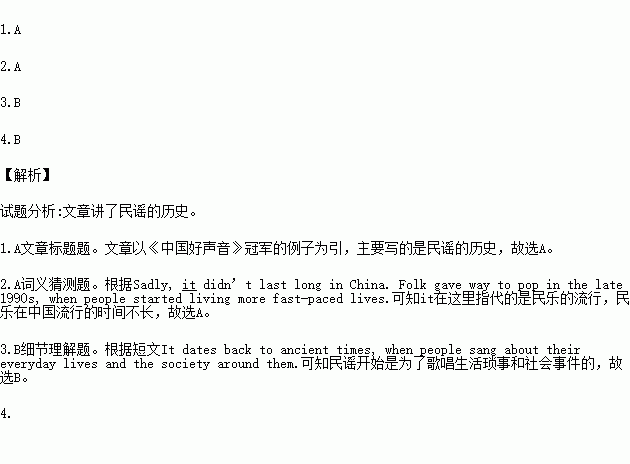题目内容
“Folk singers are more like poets than singers,” Li Yahe, a music businessman, once told China Youth Daily.
That saying perfectly describes Zhang Lei, the 34-year-old champion of the fourth “Voice of China” singing competition, which ended on Oct 7.
Critics thought Zhang’s success as a victory for folk singers. The Voice of China used to attach great importance to singing skills and vocal techniques, which are not necessarily what folk singers are good at. “Folk songs are more about emotions and storytelling,” said Li.
Folk is one of the oldest musical styles. It dates back to ancient times, when people sang about their everyday lives and the society around them.
A powerful comeback
Folk music became popular again in the Western world in the 1960s. During social revolutions, many young Westerners turned to the simple rhythms of folk. Pioneers included US singer Bob Dylan, whose songs are reflections of some social issues like the Vietnam War. Singers at that time used traditional folk instruments like the banjo, the upright bass, the mandolin and the piano.
In the late 1970s, folk music was introduced to Taiwan. The rise of singers like Lo Tayu and Chyi Yu popularized folk music, particularly among young Chinese people.
At that time, folk tunes were based on simple song structures, with pleasant chord progression and pretty lyrics, just like during old times. But they focused more on the dreams and sorrow of youth than on politics.
This continued to be the case when the folk “wave” swept Chinese mainland in the 1990s.
Folk pioneers
Sadly, it didn’t last long in China. Folk gave way to pop in the late 1990s, when people started living more fast-paced lives. But that didn’t mean folk music had disappeared from the music world entirely.
“The drop in the popularity of folk songs is because the business mode of the music industry is outdated, not because of the music itself,” folk singer Song Ke once said.
He was right. Recent years have seen folk songs gaining popularity, with the appearance of singers like Li Jian and Song Dongye.
“The popularity of the Internet has shocked the traditional profit model in music industry,” Lu Zhongqiang, manager of 13-Month, a music recording and publishing company, told Tencent Entertainment.
“Not-so-well-known music starts showing its strength when the production of mainstream music is declining,” he added.
1.Which would be the best title of the passage?
A. The History of Folk Music. B. Folk Music Pioneers
C. The Folk Music Industry. D. The Voice of China
2.The underlined world “it” in the last but four paragraph means________.
A. the popularity of folk music.
B. the focus of folk music.
C. the tradition of folk pioneers.
D. the new model of pop music.
3.Which statement is true according to the passage?
A. The Voice of China is very popular among young Chinese people.
B. Folk music once was a way to voice opinions about social issues.
C. Folk songs are more about expressing emotions than storytelling.
D. Outdated music mode is what leads to the decline of folk songs.
4.Which word can best describe the attitude of Lu Zhongqiang towards folk music?
A. Objective B. Confident.
C. Critical. D. Worried
-(61)BBut if I were you,I should leave that for some other day.You could spend a whole day there.It's much too big to be seen in an hour or so.
--I suppose it is.(62)F
一That's not a bad idea.You could spend a couple of hours there comfortably,or even a whole afternoon,watching the wild animals and all those birds.You could have tea there too.
-I'll do that,then.How do I get there?
一 (63)AWhere are we now?Oh,there's that big building.I think your best
way from here is to take Baker Street…,
-(64)D
-Oh,no A quarter of an hour or so,but; if you re in a Hurry,why not take a taxi?
一I think I will.(65)ETaxi!
| A. | Let me see. |
| B. | Well,you might. |
| C. | What time is it now?, |
| D. | Is it much of a walk? |
| E. | Ah,here's one coming. |
| F. | What about going to the zoo? |
| G. | Must I stay in London for long? |
-Er,let me see…Oh no,I ________ an operation for the whole afternoon.( )
| A. | have performed | B. | have been performing | ||
| C. | will be performing | D. | will have performed |
| A. | Bought | B. | To buy | C. | Being bought | D. | Having bought |

